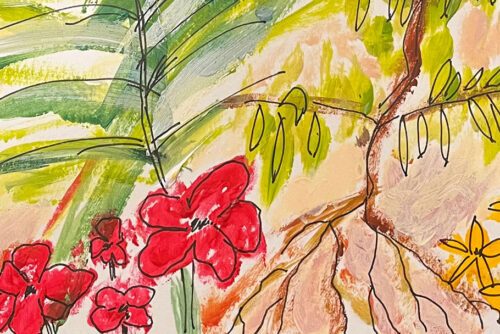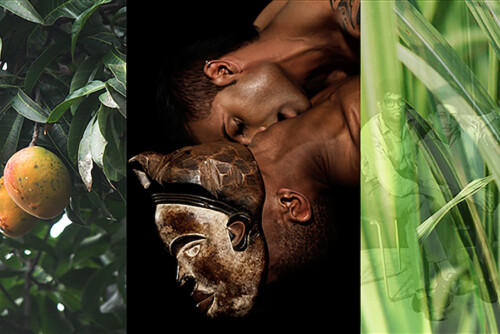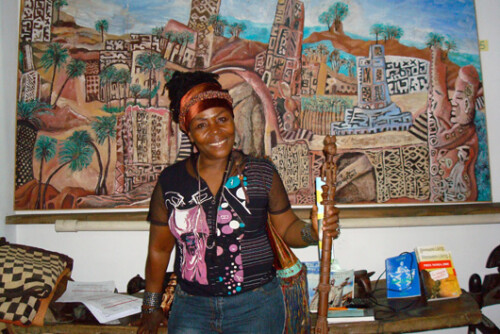La serie / The series
Manglar, tierra, agua, barro, vida, creación. Nuestra ancestralidad vibra frente la bahía de Sepetiba, a la luz de la luna y del sol, despierta la potencia femenina, saludando al vientre de la vida. Conectadas con lo sagrado de los tiempos, el fuego, la tierra, el aire, el origen que emerge del agua, resonando el encuentro hace tiempo marcado y vivenciado por las mujeres.
Mangrove, earth, water, mud, life, creation. Our ancestry vibrates by the bay of Sepetiba, in the light of the moon and the sun, awakening the feminine power, greeting the womb of life. Connected with the sacredness of time, fire, earth, air, the origin that emerges from water, resonating in the encounter long ago marked and experienced by women.
La serie Fé…Menina es una experiencia-vivencia que conecta periferias, colectivas, úteros, estéticas, memorias, inspiraciones. Ritual audiovisual femenino que celebra la ancestralidad y despierta el potencial negro.
The Fé…Menina (Faith…Girl) series is an experience that connects peripheries, collectives, wombs, aesthetics, memories, inspirations. A feminine audiovisual ritual that celebrates ancestry and awakens Black potential.
Episodio 1 / Episode 1
Iluminadas por la luna, las diosas adentran en el vientre poético del manglar. Bajo la luz de la luna menguante la exaltación a las diosas se revela en gestos, movimientos, ofrendas que dirigen la travesía marcada por fé, hechizo y sabiduría.
Illuminated by the moon, the goddesses enter the poetic belly of the mangrove. Under the light of the waning moon, the exaltation of the goddesses is revealed in gestures, movements, offerings which direct the journey marked by faith, spell, and wisdom.
*
Do ritual à performance fílmica, o fazer criativo coletivo sobre as bênçãos do cuidado
From ritual to film performance, collective creative work on the blessings of care
by Daiane Ramos and Livia de Souza Vidal
Mulheres de Pedra é um coletivo germinado em um quintal-afeto, territorializado em Pedra de Guaratiba, Zona Oeste do Rio de Janeiro. Lá mulheres se reúnem há 17 anos em torno do encontro de si e do outro. Saraus poéticos, oficinas artísticas, rodas de conversa, feiras, festivais, encontros, mostras de cinema, exposições e vivências coletivas de cuidado, são práticas, entre outras, comuns do cotidiano do espaço. Tendo a ação comunitária como base, o grupo vai se constituído de forma horizontal, em busca da experimentação do existir enquanto ser mulher e ser mulher negra em coletivo.
Mulheres de Pedra is a collective germinated in a backyard in Pedra de Guaratiba, West Zone of Rio de Janeiro. There, women have been meeting for seventeen years around understanding themselves and others. Poetic soirees, artistic workshops, conversation circles, fairs, festivals, meetings, cinema shows, exhibitions, and collective experiences of care are practices, among others, that are common in the everyday life in the space. The group is constituted horizontally with community action as a base, seeking to experiment with existing as a woman and as a Black woman as a collective.
A casa que acolhe Mulheres de Pedra é o Atelier Massas com Artes, lá está ancorado a atuação da matriarca do grupo Leila Netto e suas ativas parceiras, como Dona Nair, revirando a terra, adubando, cuidando, tecendo e bordando. Nutrem o quintal, abrilhantam as paisagens de Pedra e cultivam ali, naquele território, que escoa para além do portão, a criação, a beleza do encontro, o olho no olho que enriquece a vida. A autoria, o fazer artesanal, a formação de mulheres na área de economia solidária, da saúde, de direitos humanos, guiadas pela Educação Popular e Economia Solidária. Além das atividades pontuais, os eventos principais da casa são o Sarau Pedra Pura Poesia (atividades bimensal), o VIVAS (Vivências Interações de Visibilidades Afro Brasileiras), a Festa da Primavera e a casa acolhe o Ayó (Encontro Negro de Contação de Histórias).
The house that welcomes Mulheres de Pedra is Atelier Massas com Artes, where the work of the group’s matriarch Leila Netto and her active partners, such as Dona Nair, is anchored: turning over the land, fertilizing, caring for, weaving, and embroidering. They nourish the backyard, brighten the landscapes of Pedra and cultivate there, in that territory which flows beyond the gate, creation, the beauty of the encounter, the eye to eye that enriches life. Authorship, craftsmanship, training of women in the areas of solidarity economy, health, human rights, guided by popular education and the solidarity economy. In addition to specific activities, the house’s main events are the bimonthly Sarau Pedra Pura Poesia, VIVAS (Vivências Interações de Visbilidades Afro Brasileiras), the Spring Festival, and Ayó (Black Storytelling Meeting).
Em 2012, com a entrada de novas mulheres no coletivo, se intensificou a realização de saraus, encontros, performances, poesias, músicas, dando início a uma investigação ética-estética baseada no cuidado e na subjetividade das mulheres negras. E em 2015, com essa ativação dos processos coletivos artísticos, se fomentou o início da trajetória cinematográfica com a realização de filmes vivências, ritos performáticos imagéticos, chegando ao fazer cinema-ritual. Entendendo rito como um conjunto de gestos, palavras, pensamentos e ações que não estão ligados somente à uma crença, religião, ou costume popular, mas que pode servir para nos auxiliar na conexão com algum sagrado, que é o nosso sagrado, o nosso sentido profundo das coisas.
In 2012 with the entry of new women into the collective, the holding of soirees, meetings, performances, poetry, and music intensified, initiating an ethical-aesthetic investigation based on the care and subjectivity of Black women. And in 2015 with this activation of collective artistic processes, the beginning of the cinematographic trajectory was encouraged with the making of lived films and imagetic performance rituals, reaching the point of making ritual cinema. We understand ritual as a set of gestures, words, thoughts, and actions that are not only linked to a belief, religion, or popular custom, but that can serve to help us connect with something sacred, which is our sacredness, our deep meaning.
A primeira experiência fílmica do coletivo foi o filme Elekô, concebido dentro da poética: “Um fio de poesia vermelha conduzindo a experiência audiovisual de fazer‐se e afirmar‐se na loucura das condições de ser mulher e negra.”
The collective’s first filmic experience was the film Elekô, conceived within poetics: “A thread of red poetry leading to the audiovisual experience of making and affirming oneself in the madness of the conditions of being a woman and Black.”
E foi assim que em 72 horas geramos Elekô, nossa primeira experiência no fazer-filme. Nosso rito iniciático deu luz durante O Festival – 72HORAS RIO ao longo de um processo de 4 dias seguidos de imersão, onde criamos dinâmicas de cuidado, com massagens, afagos, comida-afeto para que pudéssemos pôr pra fora nossas dores, alegrias e questões; e dinâmicas de expressão, com rituais como a roda de axé, para que pudéssemos “pôr pra fora” propostas de performances que representassem de forma imagética nossas subjetividades
And that’s how in seventy-two hours we created Elekô, our first experience in filmmaking. Our initiatory rite was birthed during the festival 72HORAS RIO through a process of four consecutive days of immersion where we created dynamics of care with massages, caresses, and food-affection so that we could express our pains, joys, and questions; and dynamics of expression, with rituals such as the axé circle, so that we could put out proposals for performances that represented our subjectivities in an imaginative way.
A partir daí se abriu um espaço para uma investigação audiovisual e artística do feminino negro e do fazer solidário, uma metodologia onde a criação é feita coletivamente entre mulheres a partir de uma residência artística intensiva. Estávamos inaugurando uma estética da mulher preta, em uma busca de linguagens, cores, poéticas, de forma coletiva, intuitiva, espontânea, conectada, cuidadosa, amorosa e solidária. E as questões sempre presente eram, o que era criar somente entre mulheres? Com autoria e protagonismo de mulheres pretas? Como dominar todas as etapas criativas? A edição, a iluminação, a elétrica, a fotografia, possuir equipamentos, enfim. . . As parcerias não nos faltaram!
From then on a space was opened for an audiovisual and artistic investigation of the Black feminine and of solidarity, a methodology where creation is done collectively among women through an intensive artistic residency. We were inaugurating an aesthetic of Black women in a search of languages, colors, and poetics in a collective, intuitive, spontaneous, connected, careful, loving, and supportive way. And the ever-present questions were: What is creation only among women? With authorship and leadership by Black women? How to master all the creative steps? Editing, lighting, electrical, photography, having equipment. . . In short, we had no shortage of partnerships!
Assim, ainda em 2015, nosso quintal de Mulheres de Pedra testemunhou o despontar do Coletivo Audiovisual Elekô e foi realizada a filmagem de um novo projeto de criação artística coletiva, o projeto Fé…menina. Série de curtas metragens que está em processo de edição, que reuniu mais de 60 mulheres de diferentes coletivos do Brasil para criar e colaborar com performances, imagem e som.
Thus, still in 2015, our backyard of Mulheres de Pedra witnessed the emergence of Coletivo Audiovisual Elekô and the filming of a new project of collective artistic creation, Fé…menina. This series of short films now in the editing process brought together more than sixty women from different collectives in Brazil to create and collaborate with performance, image, and sound.
A série Fé…menina iniciou de uma conversa sobre territórios, uma fusão compartilhada, no primeiro encontro com Jennyfer Nascimento, poetisa preta de São Paulo, do coletivo Periferia Segue Sangrando. Ela foi a poeta convidada do Sarau Pedra Pura Poesia, na mesma edição da exposição de quadros Fé…menina da artista visual amiga do coletivo de Paraty, Amanda Vendramin.
The Fé…menina series began with a conversation about territories, a shared fusion, in the first meeting with Jennyfer Nascimento, a Black poet from São Paulo, from the collective Periferia Segue Sangrando. She was the guest poet at Sarau Pedra Pura Poesia, in the same exhibit of the painting exhibition Fé…menina by Amanda Vendramin, a visual artist and friend of the Paraty collective.
O título do livro de Jenyffer trazia essa poética: “Terra fértil”! A exposição de Amanda Vendramin e todas as suas cores, o seu mergulho feminino, vivo, lunar, místico, nos levou a um outro patamar. E vamos lá. Leila, a matriarca, determinou, “inscreve neste edital o filme que vamos fazer com a Jenyffer..” não era mais ideia de um bate papo solto. Era poética tomando corpo, forma, potência. “Inscreve e coloca como Fé…menina”, telas que não saíram da casa durante todo o ano de 2015, pautaram a proposta que se constituiu dentro da poética: “Territórios de Fé…menina. Ninadas no ventre poético do manguezal.”
The title of Jenyffer’s book had this poetic meaning: “Fertile land!” Amanda Vendramin’s exhibition and all her colors, feminine, lively, lunar, mystical, took us to another level. And let’s go. Leila the matriarch, determined, said, “Submit the film we are going to make with Jenyffer in this notice.” It was no longer the idea of loose chat. It was poetics taking body, form, power. “Inscribe and place as Fé…menina.” Paintings that did not leave the house throughout 2015 guided the proposal that was constituted within the poetics: “Territories of Fé…menina. Lullabies in the poetic womb of the mangrove.”
O primeiro episódio da série Fé…menina compôs a seleção de filmes do 10° Encontro de cinema Negro Zózimo Bulbul em 2017, com participação especial da noite de abertura.
The first episode of the Fé…menina series made up the selection of films for the Tenth Black Zózimo Bulbul Cinema Meeting in 2017, with a special participation on the opening night.
Sentimos que esse fazer é um entrelace de várias propostas subversivas. . . práticas que vão na contramão de uma dinâmica racista, patriarcal, hierárquica, opressiva. E que nossas marcas históricas trazem o desafio de lidar com tantas violências acumuladas em nossa pele, marcadas em nossos corpos. O ritual audiovisual tem sido para nós um meio para saudar e festejar o potencial, a força, o sagrado, a conexão.
We feel that this action is an interweaving of several subversive proposals. . . practices that go against the grain of racist, patriarchal, hierarchical, oppressive dynamics. And that our historical marks bring the challenge of dealing with so much violence accumulated on our skin, marked on our bodies. The audiovisual ritual has been a means for us to salute and celebrate potential, strength, the sacred, connection.
Trechos retirados da publicação Periferia da Imagem (Caixa Cultural, 2018), in https://issuu.com/tj70/docs/catalogo_cinema_periferia_da_imagem (acessado em: 01/10/2023).
Excerpts taken from the publication Periphery of the Image (Rio de Janeiro: Caixa Cultural, 2018. In https://issuu.com/tj70/docs/catalogo_cinema_periferia_da_imagem (accessed 01/10/2023).
*
FICHA TÉCNICA
Fé…Menina (2017), 6’27
Países: Guiné-Bissau | África do Sul | Argentina | Brasil | Chile
Collective Realization Films por Mulheres de Pedra, conduce for Coletivo Audiovisual Elekô
Suporte e contorno: Leila Netto e Livia Vidal
Direção de Fotografia: Erica Rocha Marinho
Direção de Cena: Amanda Palma e Monique Rocco
Camêra: Maíra Barillo, Mariana Bley, e Thais Alvarenga
Still: Viviane Laprovita
Figurino: Cali Lyrio, Gaya Rachel Neves e Castro, e Marah Silva
Maquiagem: Gaya Rachel Neves e Castro e Cali Lyrio
Produção: Maria Carolina Almeida, Monique Rocco, Amanda Palma, Erika Candido, Luciana Lú, e Roberta Costa
Performance: Ana Magalhães, Dai Ramos, Daniela Gomes, Danielle Araujo, e Blue Oliveira, Nádia Bittencourt, Monique Rocco, Leila de Souza Netto, Livia Vidal, e Simone Ricco
Direção Musical: Ana Maga e Dai Ramos
Trilha Sonora: Aissatu Seidi, Amanda Palma, Ana Maga, Beà Ayòóla, Dai Ramos, Maria Maya, Maria Carolina Almeida, Tenily Guian, e Tina e Sabrina Chaves
Sound Designer: Raquel Lázaro
Estúdio Gravação: Senac e home studio de Raquel Lázaro
Preparação Restaurativa do Grupo: Alessandra Tavares e Mari Britto (Periferia Segue Sangrando), Livia Vidal e Daniela Gomes (Mulheres de Pedra)
Desenho Logo: Aissatu Seidi e Amanda Vendramin
Arte Gráfica: Aissatu Seidi e Ana Maga
FILM CREDITS
Fé…Menina (2017), 6:27
Countries: Guinea-Bissau | South Africa | Argentina | Brazil | Chile
Collective Realization Films by Mulheres de Pedra, conducted by Coletivo Audiovisual Elekô
Support and outline: Leila Netto and Livia Vidal
Director of Photography: Erica Rocha Marinho
Scene Direction: Amanda Palma and Monique Rocco
Camera: Maíra Barillo, Mariana Bley, and Thais Alvarenga
Still: Viviane Laprovita
Costume Design: Cali Lyrio, Gaya Rachel Neves e Castro, and Marah Silva
Makeup: Gaya Rachel Neves e Castro and Cali Lyrio
Production: Maria Carolina Almeida, Monique Rocco, Amanda Palma, Erika Candido, Luciana Lú, and Roberta Costa
Performance: Ana Magalhães, Dai Ramos, Daniela Gomes, Danielle Araujo, Blue Oliveira, Nádia Bittencourt, Monique Rocco, Leila de Souza Netto, Livia Vidal, and Simone Ricco
Musical Direction: Ana Maga and Dai Ramos
Soundtrack: Aissatu Seidi, Amanda Palma, Ana Maga, Beà Ayòóla, Dai Ramos, Maria
Maya, Maria Carolina Almeida, Tenily Guian, and Tina and Sabrina Chaves
Sound Designer: Raquel Lázaro
Recording Studio: Senac and home studio of Raquel Lázaro
Restorative Preparation of the Group: Alessandra Tavares and Mari Britto (Periferia Segue
Bleeding), Livia Vidal and Daniela Gomes (Women of Stone)
Logo Design: Aissatu Seidi and Amanda Vendramin
Graphic Art: Aissatu Seidi and Ana Maga


